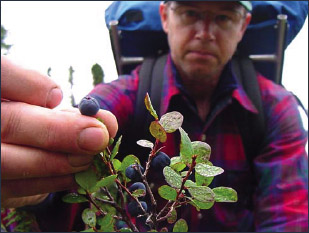Alaska blueberries: Who knew they were THIS good for you?
by Kathleen McCoy |
In 2005, current UAA professor of chemistry Colin McGill faced a choice between two research options for his doctoral work at UAF. He chose a new blueberry project because he hoped to discover and isolate the as-yet-unknown natural chemical compounds in the berry. Today, he's very glad he made that choice: Blueberries are turning out to be a new gold rush for health.

The berry's beneficial qualities were already known when McGill started his research; but at every science conference where they were discussed, the first, second and third question was always: What is it-EXACTLY-that makes this berry so powerful?
People assumed it was the colored compounds that turned them blue, the anthocyanins. But McGill isolated two other anti-inflammatory compounds that give the berry its tartness: citric acid and malic acid. Domesticated berries have relatively little; Alaska's bog blueberries are loaded.
In fact, the farther north and the harsher the climate, the higher the concentrations of these two acids in Alaska blueberries. If you dried interior berries, they would be 10 percent citric acid (that's the same amount as a lemon!) and one percent malic acid, making those two compounds the berry's dominant ingredients.
Now, the human body can make these compounds on its own. But McGill theorizes that when we are under "oxidative stress" (an imbalance that can create free radicals, which figure in lots of diseases), we may deplete our own supply. These two acids suppress inflammation, and their lack makes us more susceptible to it. Can we somehow inoculate ourselves against excess inflammation by fortifying ourselves with blueberries?
With the INNOVATE funds he just received, McGill will try and find out. He'll apply these acids under different circumstances to document and understand their effects. He's collaborating with Penn State researchers, who've shown the compounds can slow tumor growth rate, and with UAF's Kriya Dunlap, who is examining how the blueberry compounds-citric and malic acid-affect insulin uptake in the body. McGill's own question is about neurodegeneration: In the case of Parkinson's and Alzheimer's diseases, why do seemingly healthy cells begin to commit suicide?
Find out more about McGill's line of questioning and research plans.
 "Alaska blueberries: Who knew they were THIS good for you?" is licensed under a Creative Commons Attribution-NonCommercial 4.0 International License.
"Alaska blueberries: Who knew they were THIS good for you?" is licensed under a Creative Commons Attribution-NonCommercial 4.0 International License.









